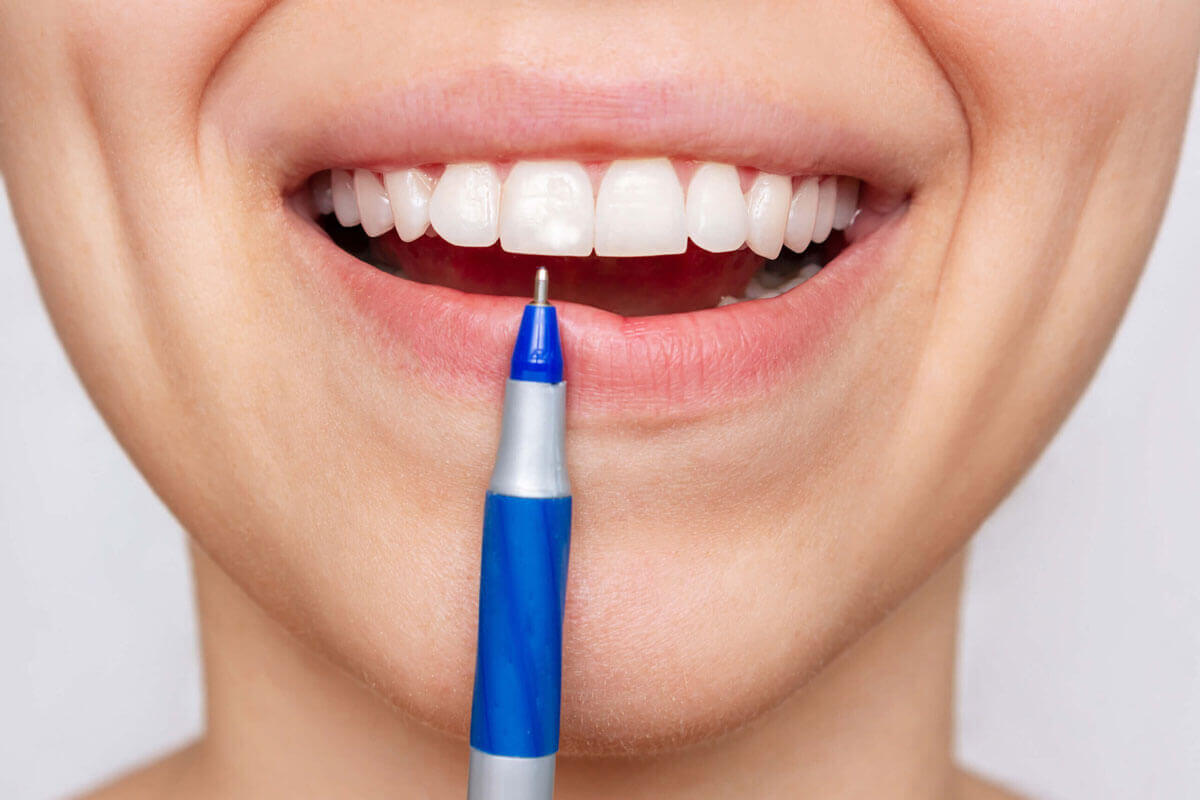White Spots on Teeth
Oral health, which is an important component of total well-being, is frequently overlooked until problems arise. One such prevalent issue is the appearance of white spots on teeth.
These seemingly benign areas can cause discomfort and self-consciousness in many people. Understanding this common dental issue allows us to take preventative measures to preserve a healthy, dazzling smile.
Table of contents
What Are White Spots on Teeth?
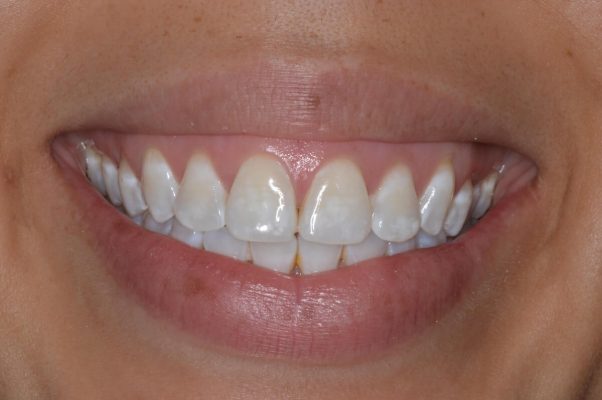
White spots on teeth are irregular, milky-white patches that stand out against the normal tooth surface. These imperfections are more than just cosmetic; they signify changes in the mineral makeup of the tooth enamel.
They can be caused by a number of disorders, including fluorosis (excess fluoride), decalcification (mineral loss), and also enamel hypoplasia (underdeveloped enamel).
These disorders can detract from the appearance of your smile and, in certain cases, indicate underlying oral health issues that must be addressed.
Causes of White Spots on Teeth
Understanding the causes of white spots on teeth is the first step towards their prevention and treatment. These spots can be attributed to:
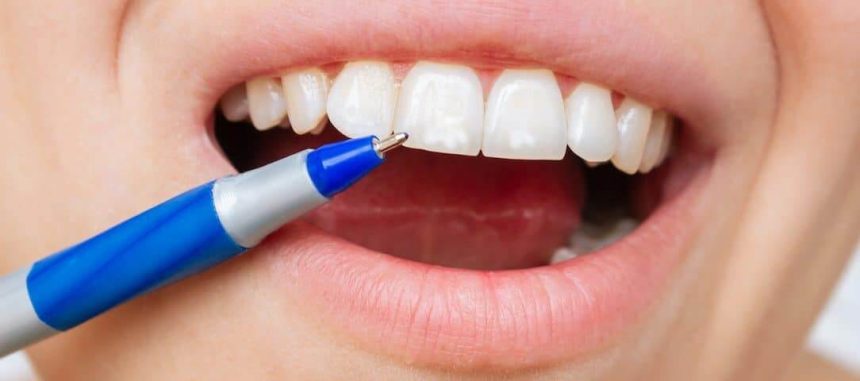
Excessive Fluoride Intake
Dental fluorosis is a disorder that commonly affects youngsters who consume an excessive amount of fluoride while their teeth are still forming. Fluoride overexposure causes the growth of white spots or streaks on the teeth.
Poor Dental Hygiene
Inadequate brushing and flossing might result in plaque buildup and decalcification areas. These are also regions where minerals from the tooth enamel have been lost, resulting in white spots.
Acidic Foods and Drinks
These can erode tooth enamel and cause white spots if consumed on a regular basis. Citrus fruits, vinegar, soda, and other acidic meals and beverages are examples.
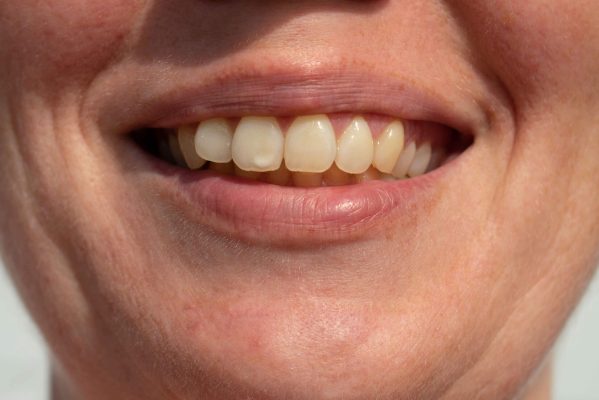
Braces
Those who wear braces may discover white patches on their teeth after they have been removed. This is frequently due to plaque accumulation around the brackets, which causes decalcification.
Genetic Factors
Some people are incline genetically to having white patches. The spots are frequently present as the teeth erupt in these circumstances.
Symptoms and Identification
Identifying white spots on teeth is typically a straightforward process due to their distinct appearance. These spots appear as uneven, milky-white patches that contrast sharply with the natural colour of the tooth enamel.
They are visible and can appear on any region of the tooth, but are most usually seen on the front teeth, affecting a person’s smile and confidence.
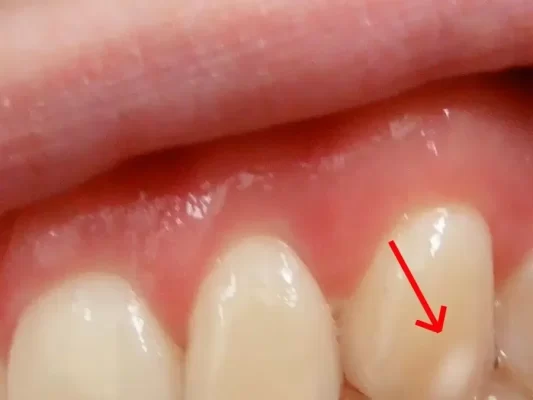
Size and Shape of White Spots
These white dots might vary in size and shape. They can be little, dot-like areas spread around the tooth or bigger patches covering a considerable percentage of the tooth surface. These spots may merge together in some situations, resulting in a more widespread discoloration.
Texture of White Spots
In addition to their visual appearance, white spots on teeth may also exhibit a different texture compared to the rest of the tooth surface.
A healthy tooth enamel is smooth and lustrous. White spot-affected areas, on the other hand, may feel rough or pitted when contacted with the tongue.
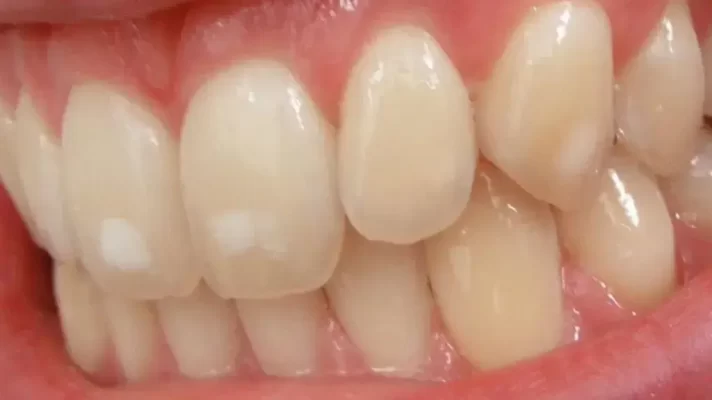
Importance of Dental Evaluation
If you detect such changes, you should consult with a dentist for a professional evaluation. Early detection can help prevent future problems and improve treatment effectiveness.
A dentist can precisely evaluate the cause of the white spots and provide the best treatment choices. Regular dental examinations can also aid in the early detection of white spots, even before they are visible to the untrained eye.
Potential Risks and Complications
While white spots on teeth are primarily a cosmetic concern, they can be indicative of potential risks and underlying dental issues. These spots are more than just stains; they are regions where the tooth enamel has lost minerals, a process known as demineralization.
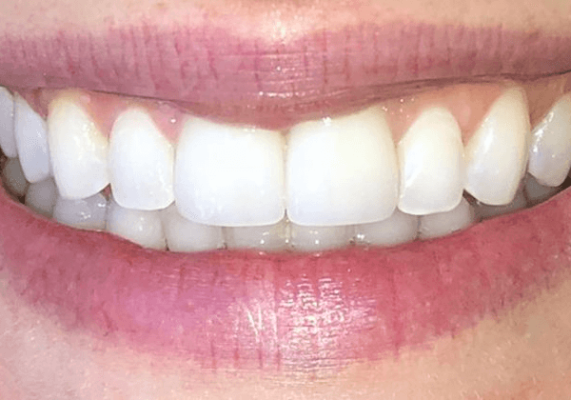
White Spots as Early Signs of Tooth Decay
These white patches, if produced by plaque buildup, can be an early symptom of dental decay. Plaque is a sticky coating of germs that builds on our teeth on a regular basis.
When we consume sugary or starchy meals or drinks, the bacteria in plaque release acids that destroy tooth enamel. The repeated acid attacks cause the enamel to lose minerals, resulting in white patches.
Progression to Cavities and Other Dental Complications
If left untreated, demineralization can proceed and cause cavities, which are irreversible damage in the form of microscopic holes on the tooth surface.
Also these cavities can get larger and impact deeper layers of the tooth over time, causing severe discomfort, infection, and even tooth loss.
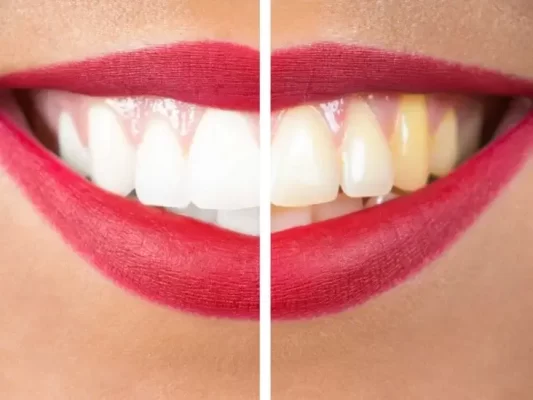
Importance of Seeking Professional Advice
As a result, it’s critical not to overlook these white patches and to seek professional help. A dentist can precisely determine the source of the white spots, assess the extent of potential damage, and propose appropriate treatment choices. This preventive strategy might help you avoid tooth decay and also maintain your oral health.
Prevention of White Spots

Preventing white spots on teeth involves a combination of good oral hygiene, regular dental check-ups, and a balanced diet. Brushing your teeth twice a day with fluoride toothpaste, flossing daily, and using an antibacterial mouthwash can all help to keep your teeth clean and plaque-free.
Regular dental examinations ensure the early detection and treatment of any dental problems. A balanced diet low in acidic foods and beverages can also considerably minimise the likelihood of acquiring white spots.
Treatment Options for White Spots
Treatment for white spots on teeth varies based on their cause. For minor cases, home treatments and over-the-counter medications can be useful. Also professional dental procedures like as microabrasion, bleaching, veneers, or dental bonding may be indicate for more severe or chronic areas.
| Treatment Option | Description | Suitable For |
| Home Remedies | Using baking soda or activated charcoal | Minor white spots |
| Over-the-Counter Products | Whitening toothpaste or strips | Mild to moderate white spots |
| Microabrasion | Removal of a thin enamel layer | Moderate white spots |
| Bleaching | Professional teeth whitening | Moderate to severe white spots |
| Veneers or Dental Bonding | Covering the affected tooth | Severe white spots |
Final Thought
White spots on teeth are a common dental issue that can be effectively manage with proper care and treatment.
They are frequently the result of changes in the mineral content of the tooth enamel cause by causes such as high fluoride intake, poor dental care, acidic food and drink consumption, wearing braces, or hereditary susceptibility.
While these spots are mostly aesthetic in nature, they can occasionally signify the beginning stages of tooth decay.
Youtube Video About White Spots on Teeth
You May Also Like
How Much Money Can A Dental Hygienist Earn?
FAQ
Excessive fluoride use, poor oral care, consumption of acidic foods and beverages, wearing braces, or genetic factors can all create white spots.
Not necessarily, but they can be an early sign of tooth decay. If left untreated, this could potentially lead to cavities.
Yes, white spots can be cured using a variety of approaches such as home cures, over-the-counter medicines, and professional dental procedures.
White spots can be avoided with good oral hygiene, regular dental check-ups, and a also well-balanced diet.
No, white spots can be decreased or even eradicated with correct treatment.




